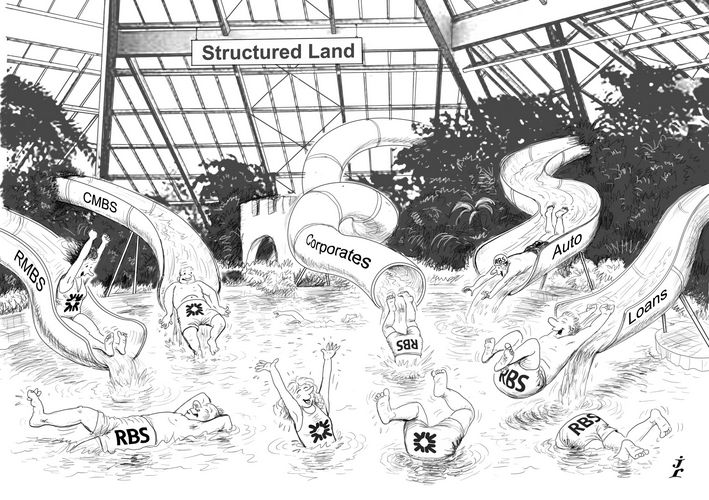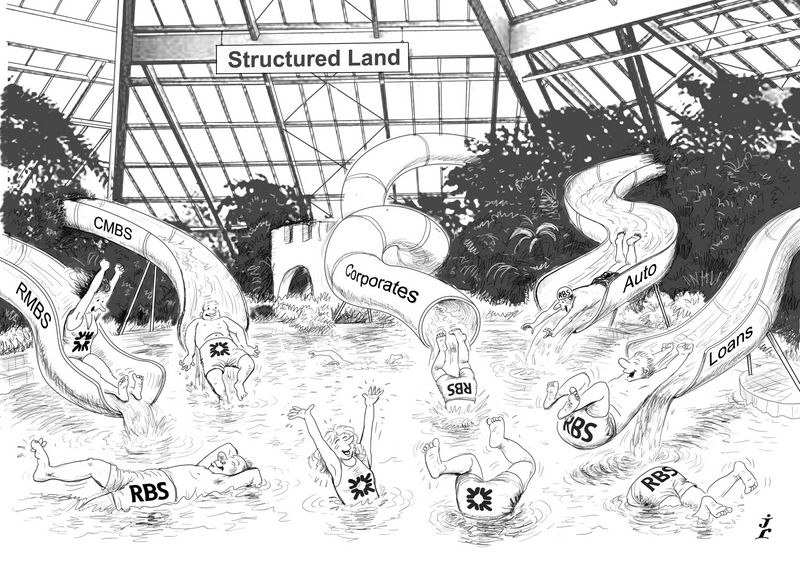Beyond the norm: The structured finance market of 2012 has been smaller but more exciting than 2011, with a lot more variety than the recent past. For consistently looking for new takes on old ideas, and reshaping structured finance convention, Royal Bank of Scotland is IFR’s EMEA Structured Finance House of the Year.
To see the full digital edition of the IFR Review of the Year, please <a href="http://edition.pagesuite-professional.co.uk//launch.aspx?eid=24f9e7f4-9d79-4e69-a475-1a3b43fb8580" onclick="window.open(this.href);return false;" onkeypress="window.open(this.href);return false;">click here</a>.
The European structured finance market continues to evolve, leaving behind its roots in consumer products. Central bank liquidity pumped into the market has reduced the pressure on issuers to pursue wholesale funding in the mortgage, credit card and auto markets during 2012.
Corporate borrowers, meanwhile, are more actively exploring secured and structured financing techniques as bank balance sheets become increasingly reluctant to write long-dated loans, even for their top clients.
And Royal Bank of Scotland has been there to deliver these solutions, in a variety of ways. In the financials area, the bank has acted on UK, Dutch, French, German, Australian and Italian consumer assets.
In RMBS, the bank’s involvement covered debut and repeat UK issues, the first Dutch 144a deal to be sold in the US market, and the first Australian RMBS in sterling since 2007.
It has arranged and sold bonds in sterling, euro and brought first-time issuers in Swiss francs and US dollars.
And in the UK corporate space, it has covered an array of assets: holiday villages, ports, airports, rail (even in US private placement format), water and social housing, acting as deal arranger in most cases.
Breadth of business
These successes all point to a deep bench of expertise in structuring and coverage. The business is split into financial institutions’ structured finance, headed by Lee Rochford, and the secured debt markets, led by James Miller. RBS also has a dedicated team for structured finance derivatives, reporting to Rochford.
“We have the largest structuring team bar none in EMEA on the FI side of the business,” said Rochford.
“In terms of pure securitisation there are a dozen professionals, but in terms of the wider structured finance skill-sets the number is closer to 50,” said Rochford.
“In the corporate secured debt market RBS has over 30 professionals,” added Miller.
Despite the slow public deal flow, RBS is still hiring – for instance, Rochford’s team hired veteran structurer Jennifer Wallaert from UBS in the summer of 2012, to focus on real estate and credit structuring, primarily in the private market.
While it is no secret that RBS is retrenching in its weaker areas – selling its cash equities business and M&A to Jefferies being the most obvious example – structured finance remains a bright spot. Management has committed 25% of investment bank capital to this business, with no plans to shrink.
RBS’s trading desk may benefit from some internal flow, but remains a 25-person team across Europe and Asia, featuring several veteran product specialists. It had traded some £12bn in 2012 up to the middle of November.
This effort is complemented by a highly respected research team led by Ganesh Rajendra. One large investor praised their publications as being “unafraid to ask the hard questions and give analysis that was not always flattering to issuers”.
RBS also runs a large investor conference in the autumn, which had 420 attendees this year.
The bank’s corporate rating creates a business challenge for structured finance – no amount of tweaking collateral arrangements can compete with a solid rating when it comes to writing swaps – but RBS is coping, amending and restructuring its structured finance swaps rather than retreating from the market. And Moody’s made a positive reference to RBS’s approach in a credit insight publication in February.
For Siena Mortgages 10-7, for example, Moody’s has set the Italian sovereign ceiling just one notch above RBS’s own rating, but the triggers in the deal were still designed to support Triple A rated securities. RBS restructured the swap agreement to be less costly if it was downgraded, without affecting the rating of the bonds.
While there is still a place for top ratings, balance sheet muscle and risk-taking, increasing numbers of structured finance derivative counterparties under rating pressure have to seek innovative solutions to stay in the business – as RBS did.
Deep and wide
Whatever the method, RBS has undoubtedly been a powerhouse of EMEA structured finance during the awards period.
More than a dozen deals were completed before the end of March, with the bank showing strength across asset classes and currencies, and continuing this theme throughout the year.
In December 2011, RBS acted as joint bookrunner on the ABP Finance deal and followed that with another joint bookrunner role on German auto ABS E-Carat 2011. The late stage of the year, however, meant that a club deal was preferred rather than a full-on marketing process – that was quite a common approach in the final quarter of 2011.
Heavyweight corporate issuers such as BAA and Gatwick followed, with the bank acting as joint lead on the first UK secured issue in Swiss francs and its first sole arranger role of the year for Gatwick Funding’s transaction.
The issuer sold £300m each of 15-year and 30-year tranches, attracting £1.5bn of demand to take out its financing needs for the entire year in one hit just two weeks into January.
Two UK deals followed, before the bank’s first continental European issue of the year – selling previously retained Dutch RMBS for Friesland Bank in Stichting Eleven Cities 8. The same month the bank took innovation to the next level as sole arranger on CPUK Finance to refinance Center Parcs’ debt (the deal is IFR’s EMEA Structured Finance Issue of the Year).
Follow-up trades from BAA, social housing institutions and a rare trade receivables deal from Trafigura all strengthened the bank’s position as dominant corporate structured finance solutions provider later in the year.
Stand-out trades
But even within the more vanilla assets of RMBS and autos, the bank recorded some stand-out trades.
It was joint arranger on Coventry Building Society’s debut UK RMBS, Leofric No1. This was the largest publicly placed sterling floating-rate note since the onset of the financial crisis. The originator placed £800m with over 20 accounts. Similar joint arranger roles followed in other large UK issues from Virgin Money (Gosforth 2012-1 and 2012-2) and Skipton Building Society (Darrowby 2).
In the Netherlands, RBS was a bookrunner on Aegon’s Saecure 11 – the first Dutch RMBS to be sold under Rule 144a, and also on SNS Bank’s Hermes XVIII, pre-placing a rare fixed-rate bond in the European ABS sector.
RBS has also been busy in the auto and consumer ABS markets. It priced three autos in separate jurisdictions. The E-Carat 2011 issue (for GMAC Bank) was followed by a UK deal from LeasePlan (Bumper 5 UK) and then a rare Italian deal from FGA Capital (A-BEST 7). A French consumer loan deal issue from Credit Agricole Consumer Finance (FCT Ginkgo Compartment Sales Finance 2012-1) also ensued.
This clutch of mandates all came without much in the way of internal demand – RBS has a portfolio of around £5bn in prime RMBS and ABS, and has issued just one deal from the Arran Cards shelf in 2012.
But internal supply did get RBS a sole-arranger role for the first post-crisis distressed commercial real estate loan transaction. Isobel Finance was a landmark transaction, taking out the vendor finance loan from the RBS Group to the SPV during the transfer of the loans to a fund managed by Blackstone.
RBS has again demonstrated a diversity of deals in a market that often struggles to get beyond UK and Dutch RMBS. While “structured finance” covers a range of business lines, with each bank defining where it starts and where it ends slightly differently, RBS has strength in every part of the market as currently constituted.
The bank has got ahead of the key trends in the market – the move to more bespoke, more private structured financings – and continues to reap the rewards.


